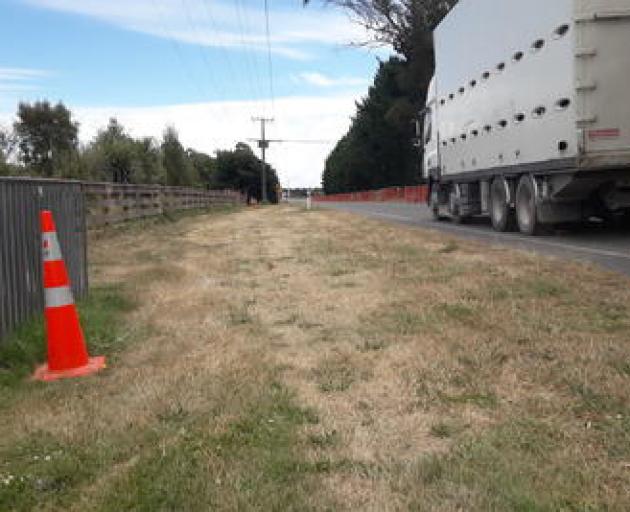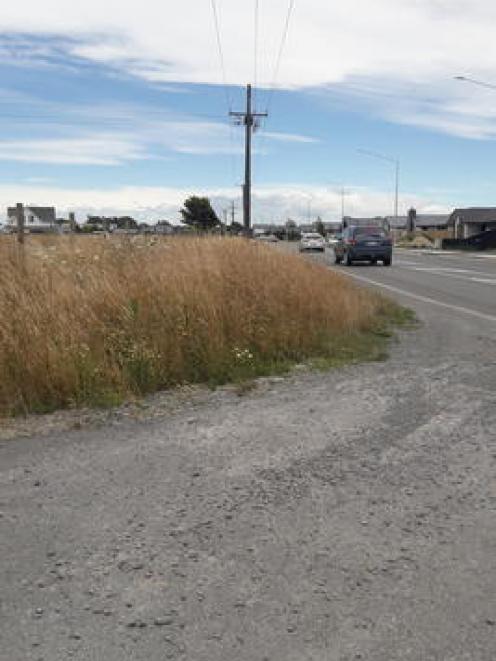
Berms on many roads in the district have long, uncut grass with some confusion over whether it is the Selwyn District Council's or the property owner’s responsibility.
With the potential for sparks or a discarded cigarette butt to ignite devastating blazes intensifying, Hororata chief fire officer Bruce Sayer has expressed frustrations with the council’s monitoring of grass growth.
“They drive around in their utes so you’d think they see stuff like that and know it’s their responsibility,” he said.
“In the good old days they (council) used to mow along the roadsides, they don’t anymore.”
Fire and Emergency New Zealand Canterbury district commander Dave Stackhouse declared a restricted fire season last Wednesday until further notice, an indication the potential for wildfires has heightened.
Restricted fire season means a permit is required for open-air fires.
The widespread blaze caused by sparks from a train shunting wagons at Kirwee on January 7 illustrated the danger.
“You can see how small sparks can quickly turn into large fires,” Stackhouse said.
Two years of high rainfall had increased grass and vegetation growth across the district, with sweltering temperatures last week exacerbating the fire risk.
The mercury hit 35 deg C in the district last Thursday and is set to rise again this weekend.
Sayer, who has lived in Hororata since 2002, doubted contacting the council would be worthwhile.
“They mow in the village, but I’ve never seen them mowing the roadsides. I don’t know if they have the ability to do it or they just don’t bother. A lot of the roadsides are quite high with grass.”

"In this case, under the council’s berm policy the adjacent landowner is responsible for mowing this area," Crawford said.
"If a resident spots an overgrown berm and is concerned about it, they should snap-send-solve or email the council about the issue with a photo and we will contact the landowner."
Crawford said the roading team monitors sightlines at intersections or roundabouts regularly.
"If any resident notices a sightline issue at an intersection they should snap-send-solve it to council to make us aware so it can be cut."
Mowing roadside grass can be a grey area with landowners and Waka Kotahi NZTA also responsible, depending on the location.
“Some farmers do and some don’t,” said Sayer.
“There’s some people that own land that haven’t done anything for the last 20 years and the grass just grows on there.
“The potential (for a fire) here is quite high. The way the weather is now, one little spark and there could be thousands and thousands of hectares burnt.”
Council maintains grass berms outside council property but will not maintain grass berms or frontages of private property throughout the district.
Landowners can apply to the council for the berms adjoining their property to be mown. Council asset engineers will assess berms against the current mowing to determine whether it will carry out mowing.
FENZ Canterbury community risk manager Dean Harker said Cantabrians were the most proactive in New Zealand regarding the reporting of fire hazards.
There had been 50 reports lodged via the FENZ website over the last three weeks, with Harker saying some parts of New Zealand register 30 per year.
Three staff were assessing the severity of the reports, with Harker adding the Kirwee fire helped raise public awareness.
Harker said the council had been responsive when an issue was raised.
“Normally the council is pretty good once we send something out. They’re very proactive. We work closely with them around fire prevention advice,” he said.
Meanwhile, Sayer urged visitors to Lake Coleridge not to park on grass at the end of their journey.
“People are parking their cars on dry grass. You drive from Christchurch, pull over on the side of the road and that’s how you can cause a fire because the exhaust is hot.
“Farmers up there feel it’s the driest it’s been for 20 years.”
• To apply for a permit head to: www.checkitsalright.nz













